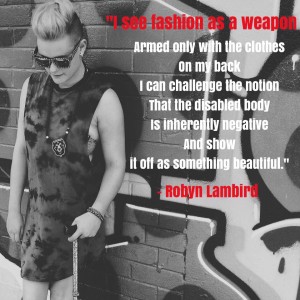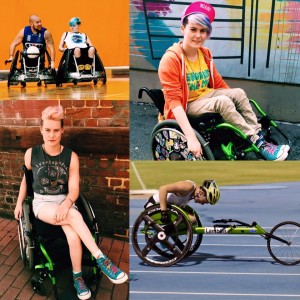We are proud to publish this excellent piece by Robyn Lambird on disability in media and excited to introduce them as our newest Ad Inclusion Ambassador. Robyn is an athlete who competes internationally in wheelchair racing, a disability advocate, blogger, fashion-lover and model.
By Robyn Lambird
Why is accurate and expansive media representation so important to people with disabilities?
As an advocate, a blogger, and a person living with a disability, accurate and more expansive media representation for people with disabilities is often the topic that is at the top of my agenda. However, I am constantly confronted with people questioning its importance when ‘bigger’ issues such as disability unemployment and poor accessibility are so prevalent within our society. For me it all boils down to cultural change.
The media in all its forms; television, advertising, film etc, plays a huge role in the creation and development of our perceptions of the world and the people within it. It’s a massive socializing agent from which we can learn many things about our society, and it’s one of the most powerful tools we have in creating the cultural change that many people living with disabilities seek.
As it stands now, the limited amount of media that does surround disability is saturated with tropes that do very little to promote a positive and accurate attitude towards disability. These stories and campaigns too often do not reflect the most common and realistic experience of life with a disability and do little to promote a meaningful shift in perception.
“[Media is] one of the most powerful tools we have in creating the cultural change that many people living with disabilities seek.”
If the current media landscape was taken as an accurate depiction of my life with cerebral palsy, it would be assumed that I’m either invisible, spending everyday being inspirational and overcoming adversity, or falling victim to the horrors of disability. Whilst none of these narratives bear any correlation to my life, they do have a very direct influence on how I am treated and viewed by others.
 I do believe that my disability has played a large part in shaping the person that I am today and I consider it an important part of my identity. However, I do not believe it should be used by the media as a vehicle to drive a narrative filled with pity or inspiration. What I do wish to see, is people with disabilities being used in the same way that any other model, actor or tv personality is used. I want to see people with disabilities being used to sell the latest range of clothing, and I want to see them on our screens as doctors, superheroes, and crime fighters.
I do believe that my disability has played a large part in shaping the person that I am today and I consider it an important part of my identity. However, I do not believe it should be used by the media as a vehicle to drive a narrative filled with pity or inspiration. What I do wish to see, is people with disabilities being used in the same way that any other model, actor or tv personality is used. I want to see people with disabilities being used to sell the latest range of clothing, and I want to see them on our screens as doctors, superheroes, and crime fighters.
I’m not saying the challenges we face should be hidden. Far from it. I just believe it should be done in a more realistic context and in a situation where it isn’t someone’s only narrative. As a person, I am not only disabled. I am a woman, I am a creator, and I am an athlete. My disability has not only brought struggle, but it has also brought me opportunity. It is the source of much of my creation, and it has given me the ability to travel the world as an athlete. These multi-dimensional individuals need to be reflected in our media.
 Through accurate and expansive media representation, we can normalise disability, shift the negative attitude surrounding it, and highlight the issues that the disabled community face. Through this, we can create a more understanding society that is open to beneficial change. Surely if we can show to the masses, using mainstream media, that individuals with disabilities are valuable, they are more likely to be seen as employable.
Through accurate and expansive media representation, we can normalise disability, shift the negative attitude surrounding it, and highlight the issues that the disabled community face. Through this, we can create a more understanding society that is open to beneficial change. Surely if we can show to the masses, using mainstream media, that individuals with disabilities are valuable, they are more likely to be seen as employable.
“We can normalise disability, shift the negative attitude surrounding it, and highlight the issues that the disabled community face.”
If we show disabled lives are worth living, our care, education, and accessibility becomes more important. If we show people with disabilities as consumers, innovation becomes more lucrative.
All of these notions lead down a path of social and cultural change, which will most definitely help in tackling those ‘bigger’ issues.
We also love this spoken word poem by Robyn:
You can also keep up with Robyn on Twitter and Facebook.
Thank you for visiting our website. You can also keep up with our mission for #adinclusion by liking our Facebook page or following us on Twitter @StartingWJulius
[Photos © Robyn Lambird ]
